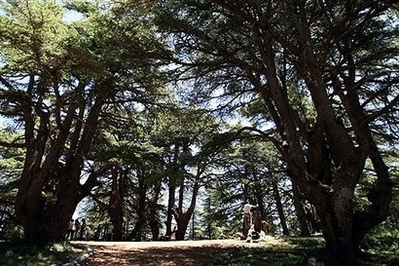 by Rana Moussaoui AYTARUN, Lebanon (AFP) – The large building near the border with Israel was already earmarked to be a green pioneer in Lebanon when it was blown apart by two missiles during the short sharp summer war of 2006. Now the demolished building has been rebuilt — and with it a ground-breaking environmental project has risen from its own ashes. In a country with serious waste management problems, the war-ravaged small town of Aytarun in the south lies in the vanguard of recycling, setting an example it is hoped will be followed by others. Located just metres (yards) from the frontier, Aytarun was devastated by the 34-day war two years ago. On the village’s edge is the Centre for Solid Waste Management a 700-square-metre (875-square-yard) structure rebuilt with Italian assistance after the conflict.
by Rana Moussaoui AYTARUN, Lebanon (AFP) – The large building near the border with Israel was already earmarked to be a green pioneer in Lebanon when it was blown apart by two missiles during the short sharp summer war of 2006. Now the demolished building has been rebuilt — and with it a ground-breaking environmental project has risen from its own ashes. In a country with serious waste management problems, the war-ravaged small town of Aytarun in the south lies in the vanguard of recycling, setting an example it is hoped will be followed by others. Located just metres (yards) from the frontier, Aytarun was devastated by the 34-day war two years ago. On the village’s edge is the Centre for Solid Waste Management a 700-square-metre (875-square-yard) structure rebuilt with Italian assistance after the conflict.
The centre refuses to dump any waste at all. "Everything is recycled, nothing is thrown away," says Ziad Abichaker of Cedar Environmental, a group that specialises in recycling technology. "We wanted to create the example of a rural town which not only gets rid of its waste but also uses it to benefit organic agriculture. "Some things are stored as we research and develop outlets for them," Abichaker adds, saying shoes can be used in a special cement for the manufacture of public benches. The facility’s five employees patiently sort through potato peelings, plastic bottles and old clothing before recycling proper can begin. In many rural areas of Lebanon municipalities burn solid waste, causing an unbearable stench and often sparking wildcat forest fires. "People did not like the smell of burning rubbish. This project is a blessing for them," Abichaker says of the traditional method of incineration. Sawsan Bou Fakhreddine of the Association for Forests, Development and Conservation says domestic waste forms 90 percent of all the country’s rubbish.
"We produce 1.5 million tons of solid waste annually in Lebanon, half of it organic," she adds.
Landfills are overflowing, and the largest — in the southern city of Sidon — is at serious risk of collapsing into the sea.
"The major problem is the lack of a national management plan," Bou Fakhreddine says, and cites a 1997 government emergency plan aimed at tackling the problem. It didn’t work.
One site intended for "40 percent of the waste ended up getting 80 percent, and it expanded in a way that was not at all environmentally friendly," she adds.
Cedar Environmental is not the first project of its kind in southern Lebanon, which suffered widespread devastation during the war.
In Aytarun the goal is zero percent waste. The "green engineers" process organic matter into compost for agricultural use in what is, quite literally, a growth area.
A truck collects six tons of household waste daily from the town of some 8,000 residents and from the nearby hamlet of Blida. This is then processed by locally made machinery.
The "star" is a compost drum in which organic matter is mixed with an enzyme mixture to accelerate fermentation over three days.
"The composting process is based on aerobic fermentation which makes the reaction faster and odourless," says Abichaker.
Conveyor belts carry raw compost to a trommel screen for sifting.
"The compost passes through several times to be purified and then we let it mature for two weeks," he says.
"Our humus, which is very pure, meets European standards for compost to be used in organic agriculture.
"At the moment we give the compost to Aytarun farmers for free. I planted 3,000 square metres of organic wheat on an experimental basis to encourage them," adds Abichaker.
The June harvest was most encouraging.
Abichaker tested his compost on three different plots of land. One was planted using no fertilizer, another was planted using about three cubic metres of compost, and the third used about six cubic metres.
"The third had the best results by far in growth and yield. Next year I’m going to plant 20 acres (eight hectares) even if I have to take out a loan."
Turning traditional agricultural methods organic is "the future of agriculture in Lebanon," the engineer believes.
"Lebanon stopped growing wheat because it was cheaper to import it. Now with rising wheat prices we will grow it and sell it. We are growing it organically so we can even sell it for more," he adds.
Nothing is left to chance at the recycling centre. Plastic bottles and cans are flattened with a press then sold.
"We will install an annex to the recycling unit where used clothing will be washed and have any metal removed before being sold as fabric to furniture manufacturers," says Abichaker.
The profits will go to the local municipality.
"Nothing is burned, nothing hidden underground. This is an example of an industry with no environmental impact," he says, adding that he hopes to see his method expand throughout Lebanon.
"It’s a snowball effect and we’re in the initial stages. If every four or five villages start a similar project, there won’t be household waste problems in Lebanon any more."



